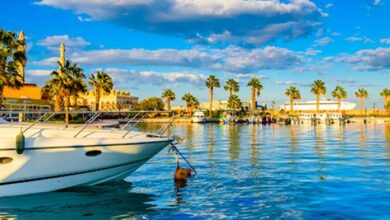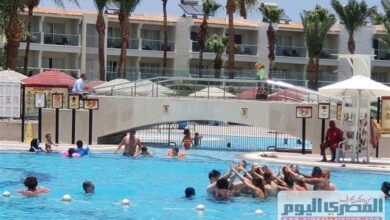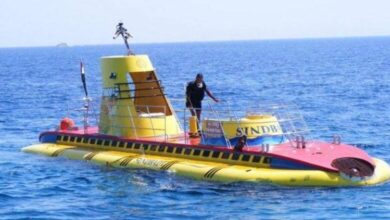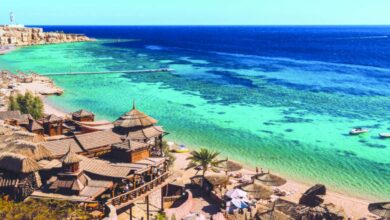HURGHADA–A small oil spill last month in the sea near Hurghada has rekindled fears among the Red Sea resort city’s stakeholders that a major incident could wipe the town off the tourist map.
“Our capital is the beach,” says Sameh Howaidek, chairman of the Red Sea branch of the Egyptian Hotels Association. “Any major oil spill would completely destroy our business.”
Hurghada has grown from a sleepy fishing village in the early 1980s into one of the biggest resort cities on the Red Sea, with over 40,000 hotel rooms. Its clear waters and world-class reefs draw over 2.5
million tourists a year, generating about US$3 billion and providing jobs for 250,000 residents and temporary workers.
The resort has grown up in the shadow of oil development. Over 180 offshore platforms dot the Gulf of Suez, squeezing the last drops from maturing subsea oil fields.
Leaking well heads, “routine” spills and passing Suez Canal tanker traffic have destroyed coral reefs and blackened beaches in the northern gulf, but until last month Hurghada’s resorts and protected offshore islands had been spared.
On June 17 dive boat operators reported an oil slick in the waters north of Hurghada. The oil fouled over 20km of coastline including resort beaches in El Gouna and Hurghada. Black sludge also
damaged several coral reefs and washed up on the shores of Tawila Island, a protected breeding area for marine birds.
Environmentalists and Red Sea resort owners have criticized the government’s slow response and lack of transparency in investigating the source of the spill.
“Nobody informed us about the spill and no single company has said they were responsible,” says Amr Ali, managing director of Hurghada Environmental Protection and Conservation Association (HEPCA), a local environmental NGO. “This says a lot about the liability and transparency of the oil [sector].”
The government belatedly acknowledged that it had cleaned up beaches following a “limited” oil spill. A Ministry of Petroleum report released on 24 June identified four possible culprits: leakage from a passing tanker, oil containers washed out in the sea, sabotaged oil rig equipment, or hot weather causing solidified oil on beach rocks to liquefy.
The report stated specifically that the leak could not have come from an oil rig.
Environmental activists accuse the government of covering up evidence that the spill originated at an offshore oil platform 50 nautical miles north of Hurghada. A video posted by HEPCA on YouTube appears to show oil leaking from the rig, which is owned by state-run PetroGulf Misr.
The Ministry of Petroleum estimates that no more than 40 barrels of oil were involved. Hotel owners dispute the amount and accuse the government of a whitewash to protect the responsible party from costly litigation and negative publicity.
“The company responsible will have to pay a lot,” says Howaidek, comparing the situation with that of BP in the Gulf of Mexico, with a clean-up bill amounting to millions of dollars.
Egyptian Environmental Affairs Agency (EEAA) officials interviewed by Al-Masry Al-Youm claimed an analysis of oil samples was “ongoing,” and damage estimates were still being formulated. However, sources close to the investigations confirmed that the lab analysis was complete and conclusive, but the results were being suppressed.
Ali fears those responsible for the spill could go unpunished.
“The amount of contradictions here is obscene,” he says. “It doesn’t make sense that you go Hollywood style in patrol boats to surround fishing boats, arrest the fishermen, burn their gear, and publicly crucify them for fishing with three lines in the water, and then completely overlook an oil spill that has a million times more negative impact.”
Egyptian law requires that all oil handling facilities file an environment impact assessment (EIA) that identifies the risks of oil spills and includes an EEAA–approved contingency plan for containment
and clean-up. Petroleum companies are required to purchase emergency response equipment for each of their rigs in accordance with their EIA.
In addition, Petro Environmental Services Company (PESCo) manages four national oil spill response centers on the Red Sea located in Suez, Ras Gharib, Hurghada and Sharm el-Sheikh.
“We’re there as a support mechanism,” says Richard Byrnes, PESCo’s in-country manager. “If everyone’s got everything in place they shouldn’t need us. We’re like the fire department. When a fire breaks out you try to put it out with fire extinguishers, but if that fails you call the fire department.”
That PESCo was called in to clean up the oil spill suggests that the party responsible had failed to carry out proper containment. It has also raised concerns about the myriad of smaller operators in the Gulf
of Suez, many of which are using recycled equipment to lower the extraction costs of exhausted wells, and have fewer containment resources.
“This spill is more evidence that [Red Sea oil] concessions should be limited,” says Ali. “We’re giving these concessions to very small companies. If this had been [a large operator like] GUPCO, they would
have moved in seconds, and we would never have heard about the spill.”
He adds that the current Red Sea zoning regime, which integrates oil and tourism, is a misguided strategy. Oil-related activities should be restricted to the extreme north of the Gulf of Suez, far from the
sensitive marine ecosystems that generate tourism revenues.
Oil Minister Sameh Fahmy said Egypt was considering reducing the number of oil rigs operating in the Gulf of Suez. He added that the reduction would make it easier to monitor the remaining platforms.
Last month’s incident was “a wake-up call,” says Ali. Hurghada might not be so lucky next time–an uncapped well can leak up to 100,000 barrels a day.
“Forget talk of a spill the size of the one in the Gulf of Mexico,” he says. “A much smaller one would completely destroy Hurghada as a tourist destination.”




